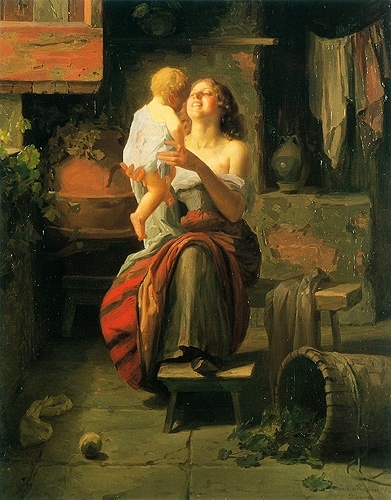When it comes to parenting, humans are a rarity among mammals in that we are a biparental species. In his 2005 article in Quarterly Review of Biology, Mart R. Gross reports the following fascinating parental figures across a few animal classes:
Mammals: 90% female-only; 10% biparental; 0% male-only
Birds: 8% female-only; 90% biparental; 2% male-only
Fish: 30% female-only; 20% biparental; 50% male-only (note that these figures apply to species that offer parental care, as most species do not)
There are several evolutionary principles that explain innate sex differences across species. I shall briefly discuss two such theories of relevant to the unique nature of human motherhood.
1. Parental investment theory
The brilliant evolutionary biologist Robert Trivers proposed back in 1972 that many sex differences across species could be explained as follows: in any given species, the sex that provides the greater minimal obligatory parental investment will be more careful in its mate choices, will be smaller, less aggressive, and will be the source of greater intra-sexual competition between the less investing sex. In the human context (as is true of many animals), women are the more investing sex. On average, women have 400 ova from menarche (onset of the menses) until menopause. A man's ejaculation on the other hand has on average 250,000,000 spermatozoa. Ova are scarce and hence must be carefully "offered" while spermatozoa are abundant and cheap. Additionally, while men's parental investment could be as minimal as a one-time sexual dalliance, women must endure the physiological costs of gestation (roughly 80,000 additional calories are needed) and lactation, the risks of childbearing mortality, and the increased dangers inherent to lesser mobility during the gestational period (a very real threat in our evolutionary history). The minimal obligatory parental investment is so titled toward women that it is not surprising that motherhood holds a very privileged position within the human experience.
2. Paternity uncertainty
Many sex differences are rooted in the asymmetry between maternal certainty (there is no such thing as maternal uncertainty) and paternal uncertainty (men did not evolve with DNA paternity tests at their disposal). On this point, see my earlier Psychology Today article titled Who's Your Daddy? Global Nonpaternity Rates). Countless sex differences are rooted in this very simple reality including sex differences in how men and women respond to various types of infidelity, sex differences in attitudes toward hospital paternity testing of newborns, the larger monetary gifts offered at weddings from the maternal side of brides and grooms, as well as ascriptions of resemblance of fetuses to their dads (see also my YouTube clip Do Fetuses Resemble Their Dads?).
Hence, the unique role that mothers hold in people's lives is not rooted in arbitrary gender roles, as some social constructivists would have you believe. Rather, the mother-child relationship is sacrosanct because of these very real evolutionary principles. This in no way demystifies the mother-child bond rather it offers a scientific understanding of its distinct and privileged quality (albeit all is not always rosy when it comes to motherhood as per my earlier Psychology Today article Mothers Who Harm Their Kids to Garner Attention). Incidentally, readers might be interested to know that mothers are much more likely than fathers to correctly identify their infants' cries.
Happy Mother's Day!
Note: This article was also published on my Psychology Today blog on May 8, 2015.
